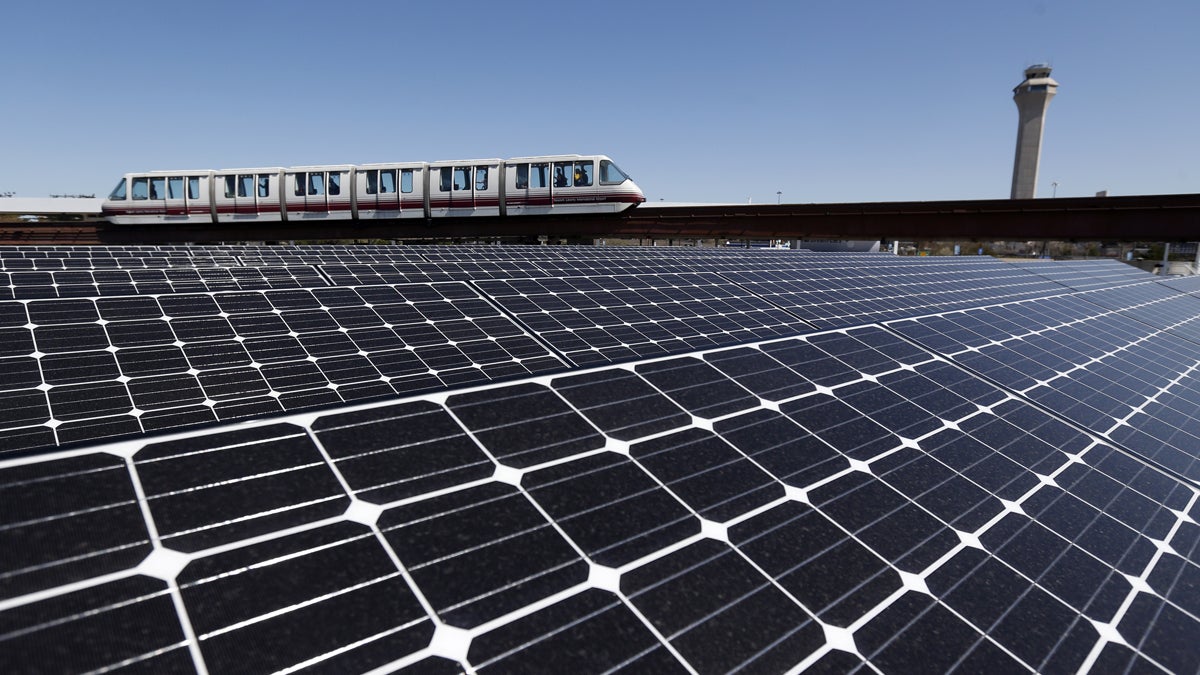Energy suppliers ordered to stop passing on higher costs to N.J. customers
Tens of millions of dollars are on the line as third-party suppliers dispute Board of Public Utilities’ order not to increase fixed rate during a term of contracts.

Solar panels on the roof of the building supplying energy to the AirTrain at Newark Liberty International Airport soak up the rays. A New Jersey lawmaker wants the state to aim for 80 percent renewable energy use by 2050. (AP file photo)
This story originally appeared on NJ Spotlight.
—
In a dispute arising out of the state’s new clean-energy law, independent energy suppliers have been ordered to stop passing on higher costs to customers as a result of expanded requirements to supply solar energy.
The New Jersey Board of Utilities ordered so-called third-party suppliers to halt the practice and to refund customers, a step that could run into tens of millions of dollars, according to representatives of the Retail Energy Supply Association, which is contesting the order.
The issue involves only customers who have switched from their incumbent electric utility to third-party suppliers with fixed-price contracts. The board’s staff warned increasing the fixed rate during the term of a contract is prohibited by energy competition rules adopted by the agency.
But the suppliers counter that the new energy law includes a provision recognizing the added solar purchase requirements reflect a change in law, allowing price increases to pass on the obligations to existing customer contracts.
“The conclusion that suppliers must ‘cease and desist’ from passing through increased charges due to the CEA (Clean Energy Law) appears to be based on the flawed reasoning that comments from the board staff override a statute that was subsequently enacted by the Senate and General Assembly of the state of New Jersey and signed into law by the Governor on May 23, 2018,’’ according to a brief filed by the suppliers’ association.
A question of fairness
The price increases across all the energy suppliers could amount to as much as $70 million or more, according to Robert Gibbs, director of corporate and regulatory affairs for Direct Energy, one of the largest retail energy suppliers in the state. “It wouldn’t be fair for us to eat those costs,’’ he said.
The BPU declined to comment on the matter since it is pending before the agency and will be dealt with at an upcoming agenda meeting, according to Peter Peretzman, a spokesman for the board.
In its letter in late January ordering suppliers to stop passing on the costs, however, it acknowledged the likelihood that the energy companies would like to pass on costs to customers to recoup those costs.
“However, for many customers, this would defeat the purpose of a fixed price contract,’’ the board contended. “Customers who choose fixed price contracts do so in order to avoid price risk.’’
Those risks were underscored in the winter of 2014 when residents who had switched to new suppliers were hit with huge, unexpected increases after an unusually cold spell spiked natural gas prices, and subsequently electricity prices.
State broke up energy monopolies in 1999
The debate has been a recurring one since the state broke up energy monopolies in 1999 and allowed residents and businesses to shop around for different suppliers than their incumbent utility. It is partly due to the structure of how the state goes about buying energy for customers who do not switch — buying needed supplies in yearly increments.
In the past, the association has argued its members have been hurt by new state policies adopted after they already entered into contracts before new mandates were issued to ramp up supplies of renewable energy, typically more expensive than electricity from more conventional sources, like natural gas and coal.
Unlike state utilities, the independent suppliers generally are not allowed to pass on those new mandates to their customers, a distinction they argue creates a disadvantage in the supposedly competitive markets.
The increases in the solar costs show how regulations distort the market, according to Murray Bevan, who filed the petition asking the board to contravene the “cease and desist’’ order from its staff. “Markets don’t work if not priced properly and in a competitive way.’’
That has been a recurring criticism of New Jersey’s deregulation law. According to data from the BPU, only about 10 percent of residential accounts have switched to new electric energy suppliers as of the end of 2018. Roughly 63 percent of the commercial and industrial users have opted to get energy from someone else than their incumbent utility.
WHYY is your source for fact-based, in-depth journalism and information. As a nonprofit organization, we rely on financial support from readers like you. Please give today.




